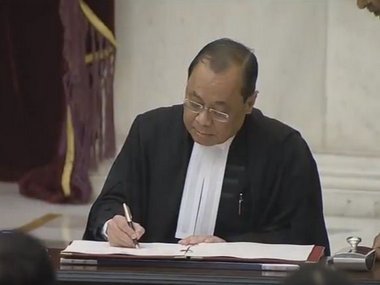On his very first day in office, newly-appointed Chief Justice of India (CJI) Ranjan Gogoi made it clear to litigants and advocates that he will not let the process of law get in the way of delivery of justice. On Wednesday morning, he made the astounding announcement that the morning ritual of ‘mentioning’ has to be done away with and should be exercised only in exceptional cases by the advocates on records or their junior associates. Mentioning is an unwritten custom or practice in the courts of law wherein the litigant prays to the court to take up his matter before the date assigned because of an urgency that has arisen. For this, he has to apprise the court about the case and demonstrate the circumstances, which are ordinarily out of his control, due to which intervention of the court is required at that stage. The litigant also has to show that if the court does not meet the issue with urgency, a grave injustice will be caused to him and because of that, the court would stand justified in giving precedence to his case over others. [caption id=“attachment_5306721” align=“alignleft” width=“380”] Chief Justice Ranjan Gogoi at his swearing-in ceremony. Image Courtesy: DD News[/caption] The ritual of mentioning is usually carried out in the morning as soon as the court convenes. For that, the advocate is generally required to prepare a document typically not longer than one or two pages in length, called a precipe. This is placed before the judge who is assigned such cases by the master of the roster — the Chief Justice. In the precipe, very briefly, the facts that form the grounds for the asking for the early intervention of the courts are stated. Further, every lawyer asking for an early mentioning is given a brief 30 to 40 seconds wherein he has to convince the court as to why the matter should be listed earlier. On Wednesday, Gogoi made it clear that he wants to reduce this practice. He was quoted as saying, “No mentioning! We are working out the parameters… if someone is being released today, then yes… if someone is being hanged today, then yes… if somebody is being evicted today, then yes… if there is risk of demolition, yes….beyond that, No!” Despite seeming like a justifiable practice, there are basically two problems that arise out of this ritual. First, it takes up a part of the time of the court that can be used for adjudicating on matters that are to be decided on the said day. Usually, at least 15 to 20 minutes of the court’s time gets consumed in this process, wherein there are many frivolous applications that are submitted on redundant grounds, asking the court to take up the matter early. Second, and more important, this is a procedure that is usually used to abuse the process of the court. For example, if an individual is yet to sell his property due to certain personal difficulty and his matter is listed four months later — a reasonable time frame in which he can arrange for the same, a mentioning if granted can list the matter before the specified date wherein he will have to then arrange to sell his property in a hasty manner, due to which his profits margin would decrease. Therefore, such tactics are usually played to harass the other side’s litigant into submitting to the draconian demands that are made by the party seeking to mention the matter.
It must be noted that this practice had become a form of institutionalised discrimination towards junior advocates. It perpetuated the domination of old caucuses of senior advocates, who would bully their cases and push them right in front of the queue, whereas cases of junior advocates would languish right behind, at an enormous cost to the concept of justice.
This step by the Chief Justice should be therefore be welcomed. This is because it strikes the right balance between the matters where there’s a genuine urgency and matters where there isn’t. It should be remembered that the abuse of the process of court is a problem that should be resolved at the earliest and Gogoi has made it very clear that during his tenure, such procedures won’t get in the way of the delivery of justice. Raghav Pandey is an Assistant Professor of Law at Maharashtra National Law University, Mumbai and Neelabh Bist is a Fourth Year student of Law at Maharashtra National Law University, Mumbai


)

)
)
)
)
)
)
)
)



